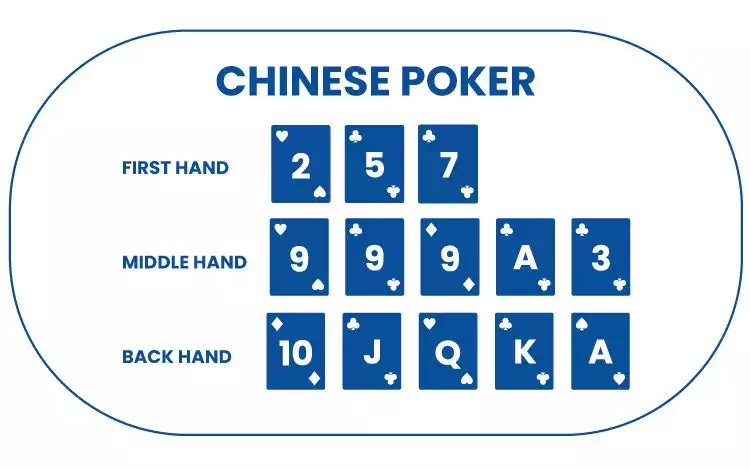Chinese Poker
Chinese poker is a distinct kind of poker whose gameplay is very different from that of other, more popular poker variations like Hold'em, Omaha, or Stud. However, as long as you are familiar with the typical poker hand rankings that most games share, then you should be able to quickly get up to speed. However, if you have never played poker before, you should explore our how-to-play poker guide to give you a basic knowledge of the overarching elements and features of poker.
The game is most popular in Hong Kong and Southeast Asia, but it also has popularity in the USA and is growing in its player base worldwide thanks to online casinos. Being such an international game, Chinese Poker goes by many names.

It is known by the names Sap Sam Cheung (十三張) in Cantonese and Xập Xám Chướng in Vietnamese, which approximately translate to 13 cards.
'Russian Pai Gow' is the best translation for Luosong Pai Jiu (捅宋牌湝), as it is sometimes called in Chinese.
Chinese poker, or occasionally Russian poker, is the most popular term for it in the United States (though some also use the phrase Chinese poker to refer to the game 'Big Two'). It goes by the name Pepito in Hawaii.
It is referred to as Pusoy in the Philippines (not to be confused with Pusoy Dos, which means Big Two). Good, Better, Best is another term that is occasionally used to describe the three hands that a player must make in order to win.
After receiving 13 cards each, participants in Chinese poker attempt to form two five-card hands and one three-card hand. Whichever player makes the best hands wins points. In Open-Face Chinese Poker, all cards are played face up, as opposed to all cards being played face down in Traditional Chinese Poker.
Continue reading as we take a closer look at this intriguing take on poker. In today’s article, we will be giving you an in-depth guide that includes the rules for Chinese Poker, Chinese Poker card combinations, scoring, terminology, and more.
Rules when Playing Chinese Poker
Like any game, the Chinese Poker card game has a specific rule set. While these may vary slightly between different types and offshoots of the game such as Open Chinese Poker, the core rules for Chinese Poker are as follows:
Typical Chinese Poker games involve 2-4 players
Before play, a point value must be agreed on by players. In the case of online and live casino gameplay, this is usually already stipulated within the house rules.
Each player is dealt 13 cards at the start of the game and these cards must be sorted into two five-card hands and one three-card hand and must be ordered from weakest to strongest.
- The "top hand" of three cards should comprise of your ‘weakest’ cards. As its name suggests, the player places this hand on the top row.
- The “middle hand” is the first of your five-card hands, and should be the lesser valued of the two. It is placed in the middle row.
- Your “bottom hand” is your second five-card hand and should be your strongest possible hand. It is placed in the bottom row. (As Chinese Poker uses classic poker hand rankings, the best possible hand in Chinese poker is a Royal Flush (A, K, Q, J, 10).)
All hands are placed face down on the table and players compare hands showdown-style, starting with the top hand, then their middle hand, finishing with their bottom hand, with points awarded for each.
Players may accrue extra points for making specified ‘strong’ hands which is known as ‘Royalties’.
The winner is the player who has accrued the highest points. If a player's three hands are all straight or flushes then they automatically win the round.
Other Rules in Chinese Poker
There are other, more specialised rules typically seen in Chinese Poker that players should be aware of. Of course, by reading the game information for your chosen Chinese Poker card game will tell you if any special rules of note are included in play. Below we have outlined the most commonly seen additional Chinese Poker rules that you will encounter during play:
Scooping
Usually, a player receives a bonus when they scoop—that is when they win all three hands versus one opponent. The Taiwanese variations are most likely to have this additional rule with awards successful players with a bonus of double the points. A player's score is doubled again if they achieve a ‘home’ run which is where they Scoop all other players.
Calling a natural hand, on the other hand, spares it from scooping and is therefore scored individually. A natural hand is a unique kind of royalty awarded when all 13 cards fall into a specific "special hand" category.
Fouled Hand
A fouled hand can occur in many ways, such as when a player has an excessive number of cards in a certain hand (for example 5 cards in their ‘top hand’) or sorts their cards against the rules (such as placing their strongest hand as their ‘middle hand’) then other players immediately win the pot.
Lowball in the Middle
Sometimes, you can play with the middle hand being a 2-7 Lowball hand rather than the regular poker hand consisting of five cards. While some players give royalties to any player who has a hand deserving of royalty, it is more typical for royalties to go solely to the player who had the higher-valued hand. For instance, only player 2 would receive the royalty if player 1 had quad sixes and player 2 had quad sevens.
Some players give each unique royalty a different number of points. The guidelines for allocating points in Chinese poker can vary wildly. In home or casual games, you and your opponents are free to use any system, set of rules, or combination you choose; so long as all players agree. In casino settings, the system will be dictated by the house.
Hand Settings in Chinese Poker
As mentioned earlier, the aim of Chinese Poker is to organise the 13 cards you are dealt into three hands, one with three cards, and two five-card hands. These are known as ‘hand settings’. Of the three hands you choose, the best hand must be the bottom hand, which is a five-card poker hand. A five-card poker hand that is weaker than the bottom hand but stronger than the top hand is required for the middle hand. While the top hand must consist of three cards and must be the weakest of the three.
Five-Card Hands
The five-card hands are ranked according to the traditional poker hand hierarchy ranging from a High Card combination; A-Q-9-6-3 (different suits, non-connected, unpaired), to a Royal Flush, 10, J, Q, K, A (all of the same suit).
Three-Card Hands
The only three-card hands in Chinese poker are triples, pairs, or high cards. For the three-card hand, neither straights or flushes are permitted as there are not enough cards in said hand to achieve these outcomes.
Scoring in Chinese Poker
Chinese Poker uses something called units, which are predetermined monetary amounts that participants agree on using before the game starts, as opposed to blind or ante structures for stakes in other poker games.
As a result, unlike other poker games, no poker chips are needed, thus scores can be kept track of using just a pen and paper. This allows participants to settle up with each other at the end of the session rather than having to pay up after every hand.
In terms of scoring and winning/losing units, each player obtains one unit from each opponent they defeat in hand. This process is repeated for the top, middle, and bottom hands, in that order.
So, let’s say the following order was achieved for the top hands rankings.
Player 1 (highest-ranked top hand): + 3 units
Player 2: + 1 unit
Player 3: - 1 unit
Player 4 (lowest-ranked top hand of the four players ): - 3 units
Points will be awarded as follows:
Player 1: Gains 3 units (one from each player) as their top hand beats all other top hands
Player 2: Gains 2 units from players 2 and 3, because their hand beats theirs, but must give 1 unit to player 1 whose hand has beaten theirs.
Player 3: Gives one unit each to players 1 and 2 due to their superior hand, but gains 1 unit from player 4 as they beat their hand for a total loss of 1 unit.
Player 4: As player 4 lost against all other players, they must give one unit to each of the other players.
Chinese Poker Royalties
In Chinese poker, you can get bonus points in addition to points for assembling stronger matching hands by position than your opponent. These incentives, referred to as "royalties," are typically given out for building a particularly robust series of hands.
The royalty bonuses in different games can change. Certain royalties reward points for placing a good hand in a certain spot, while other royalties award points based on specific requirements for your 3 hands as a whole.
Common Chinese Poker royalties are as follows:
Strong Hands
A royalty is usually awarded for quads or better in the bottom, a full house or better in the middle, and trips (three of a kind) in the top.
13-Card Hands
When your 13-card hand satisfies specific requirements, like producing one 13-card hand straight from 2-A Royalty points may be awarded.
Three of the Same
This is another example of a 13-card hand that is commonly awarded Royalty points. Three of the same refers to a 13-card hand that consists of three straights or three flushes.
No People
Another example of a Royalty-point-worthy 13-card hand, ‘No People’ refers to a hand where players have not been dealt any ‘face’ cards (J, Q, K).
The 13-Card Hand Bonuses (Naturals)
Naturals are unique kinds of royalty in which the player does not set their hand and is paid out right away (before anyone else surrenders) if they are dealt. Regardless of hand-to-hand comparison, these hands will automatically scoop.
Commonly seen Naturals are as follows:
Dragon
A Dragon awards 36 points, making it the most valuable 13-card Bonus. A Dragon is formed of a 13-card straight from a high-card Ace to low-card 2.
12 Royalties (All Broadway)
12 Royalties, also known as ‘All Broadway’ awards 32 points, and is awarded for hands which only include Jacks or higher (J, Q, K, A).
Three Straight Flushes
This awards 24 points and occurs when the player draws two five-card straight flushes and one three-card straight flush. In this scenario, any Royal Flush that is achieved counts as a straight flush.
Three Quads
Worth 20 points, a hand with Three Quads had three four-of-a-kind hands, plus one unrelated card.
All Low 2/Highs 1
Worth 12 points, this hand is created by two scenarios; a hand where all cards are 8 or below, or a hand where all cards are 8 or above.
Full-Colored
Worth 10 points, this bonus is awarded when players' 13-cards are either all red (comprising of hearts and diamonds), or all 13-cards are black (clubs and spades).
Four Triples
Worth 8 points, this hand will have four three-of-a-kind combinations, plus one unrelated card.
Six-and-a-Half Pairs
Worth 6 points, this is a 13-card hand with six pairs plus one unrelated card. In this scenario, any four-of-a-kind combination counts as two pairs.
Three Straights
Worth 4 points, this bonus comprises a hand with two five-card straights, and one three-card straight.
Three Flushes
Worth three points, players achieve this bonus by landing two five-card flushes and one three-card flush with an eight-card flush counting towards two flushes.
The Surrender
A player may elect to "surrender" their hand in certain situations rather than attempting to construct their 13 cards into different hands. This is a riskier play that is comparable to folding in a typical poker game.
When you surrender, your opponent gets fewer points than if they scooped, but still more than if they had won two out of three hands. It is worth noting that some variations of Chinese poker do not permit surrendering.
Chinese Poker Variations
As such a jet-setting card game, it can be expected that numerous variants of Chinese Poker have sprung up over the years. Below we have explored the more common variants in more detail:
Open Face
In Open Face Chinese Poker (OFC), each player is dealt the first five of 13 cards. Taking those five cards, each player begins building their three hands, face up. A card cannot be removed from one of the player's three hands once it has been placed there. Following the conclusion of the first round, each player draws one card at a time and puts it into their hand.
Similar to traditional Chinese poker, the goal of Open Face is to score a stronger top, middle, and bottom hand than your opponent. Open-Face Chinese Poker typically pays more royalties, and mis-sets are also far more prevalent.
Fantasy Land Bonus In OFC
In the following round of Open Face Chinese Poker, a player enters Fantasy Land if they make a pair of queens or better with their front hand.
You receive all 13 cards at once when you are in Fantasy Land, and you cannot put them together until every other player has established their hand. In the subsequent round, if you fulfil the following requirements, you can stay in Fantasy Land:
- Achieve trips (three of a kind) in the top hand.
- Make a full house or better hand in the middle hand.
- Make Quads or better in the bottom hand.
Pineapple
Pineapple Poker is played similarly to Open Face Chinese Poker, however the method the cards are dealt is different. Starting with five cards each, each player starts allocating them to their hands in a manner similar to OFC.
Each player draws three cards after the first round, keeps two of them in their hands, and discards the other. Because only the player who drew the card can see the discards, you can utilise this to your advantage and prevent your opponent from finding the high-scoring cards they are after.
Best Online Casinos to Play Chinese Poker
We recommend the following top online poker sites for their selection of excellent poker and Chinese Poker games:
Genting Casino

Get a 100% Bonus
Up to £25 + 50 Free Spins
on Big Bass Bonanza
Grosvenor Casino

New Players
Deposit £20
Play with £40
Prime Casino

Get 100% Bonus
up to £25
+ 50 Free Spins on Big Bass Bonanza
Chinese Poker Final Thoughts
Chinese Poker is a unique take on traditional poker that requires clever strategy with how you utilise your hand, instead of the ability to ‘read’ players which is a big component of traditional poker games. With such a unique style of gameplay that is easy to learn and feeds off prior knowledge gained from traditional poker it is a shame that in the Western world, Chinese Poker is better known. We can only hope that the continued improvements made to online casinos and the innovations seen in live casino games can help Chinese Poker gain more mainstream appeal.
Of course, with all games; whether new to you or well-liked it is important to practice responsible gaming practices. Never wager more than you can afford to lose, set a budget and time limit, and when the fun stops; stop.